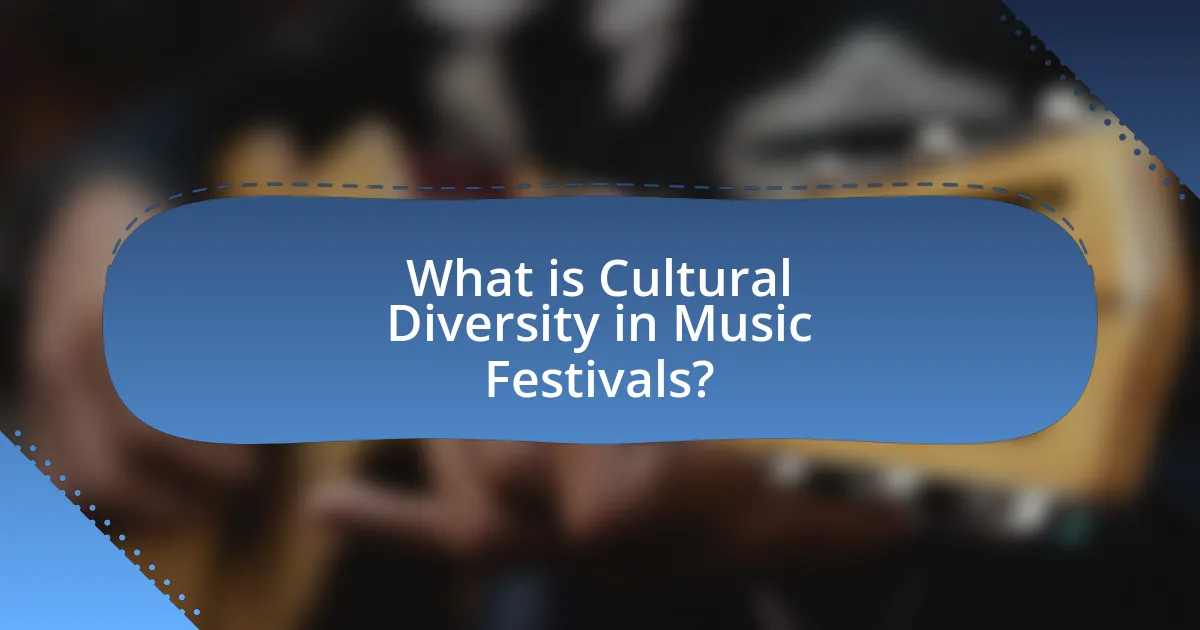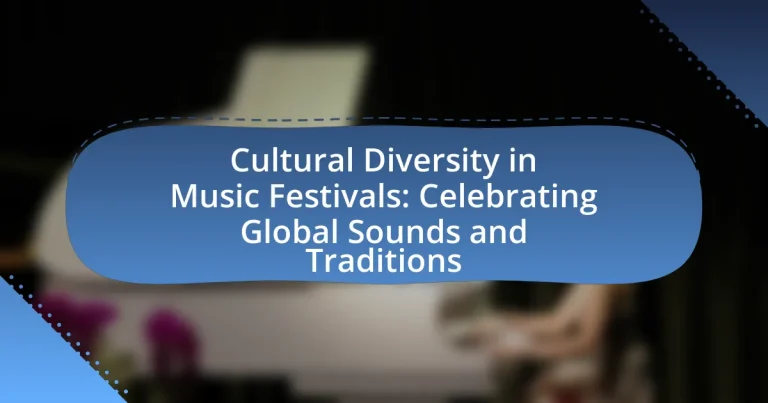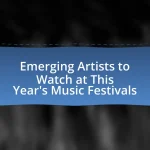Cultural diversity in music festivals encompasses the inclusion and celebration of various cultural expressions, traditions, and musical genres from around the world. This article explores how cultural diversity manifests in music festivals through diverse musical genres, artists, and cultural practices, promoting cross-cultural understanding and social cohesion. It highlights the importance of music festivals as platforms for cultural exchange, the challenges they face regarding representation and accessibility, and best practices for ensuring inclusivity. Additionally, the article discusses the benefits of attending culturally diverse festivals, including enhanced cultural awareness and community connections, while providing strategies for respectful engagement with diverse cultures.

What is Cultural Diversity in Music Festivals?
Cultural diversity in music festivals refers to the inclusion and celebration of various cultural expressions, traditions, and musical genres from around the world within a festival setting. This diversity enriches the festival experience by showcasing a wide range of artistic performances, fostering cross-cultural understanding, and promoting social cohesion. For instance, festivals like the World Music Festival in Chicago feature artists from multiple countries, highlighting different musical styles such as Afrobeat, reggae, and traditional folk music, thereby reflecting the global tapestry of cultural heritage.
How does cultural diversity manifest in music festivals?
Cultural diversity manifests in music festivals through the inclusion of various musical genres, artists, and cultural practices from around the world. Festivals often feature performances that represent different cultural backgrounds, showcasing traditional music, dance, and art forms. For instance, events like the Coachella Valley Music and Arts Festival in the United States and the Glastonbury Festival in the UK highlight a wide array of international artists, reflecting global musical trends and cultural expressions. This representation not only enriches the festival experience but also promotes cross-cultural understanding and appreciation among attendees, as evidenced by the increasing popularity of world music genres and the growing number of multicultural festivals globally.
What are the key elements that define cultural diversity in this context?
The key elements that define cultural diversity in the context of music festivals include the representation of various musical genres, the inclusion of artists from different cultural backgrounds, and the celebration of unique traditions and practices. These elements foster an environment where diverse cultural expressions are showcased, allowing attendees to experience a wide range of sounds and performances that reflect global heritage. For instance, festivals often feature genres such as reggae, flamenco, and traditional folk music, highlighting the rich tapestry of global musical traditions. Additionally, the participation of artists from various ethnicities and regions enhances the festival’s cultural richness, promoting cross-cultural understanding and appreciation.
How do different cultures influence the music played at festivals?
Different cultures significantly influence the music played at festivals by introducing unique instruments, rhythms, and vocal styles that reflect their heritage. For instance, the incorporation of traditional African drumming in music festivals showcases the continent’s rich rhythmic diversity, while the use of sitars and tablas in Indian festivals highlights the intricate melodies and spiritual themes of South Asian music. Additionally, festivals like the Rio Carnival in Brazil feature samba, which is rooted in Afro-Brazilian culture, demonstrating how cultural backgrounds shape musical expressions. This blending of cultural elements not only enriches the festival experience but also fosters cross-cultural understanding and appreciation among attendees.
Why are music festivals important for cultural exchange?
Music festivals are important for cultural exchange because they serve as platforms for diverse musical traditions and cultural expressions to be shared and appreciated globally. These events bring together artists and audiences from various backgrounds, fostering interactions that promote understanding and appreciation of different cultures. For instance, festivals like the World Music Festival in Chicago showcase artists from multiple countries, allowing attendees to experience a wide range of musical styles and cultural narratives. This exposure not only enriches the participants’ cultural knowledge but also encourages collaboration among artists, leading to innovative musical fusions that reflect a blend of cultural influences.
What role do music festivals play in promoting cultural understanding?
Music festivals play a significant role in promoting cultural understanding by providing a platform for diverse musical expressions and cultural exchanges. These events bring together artists and audiences from various backgrounds, fostering interactions that enhance appreciation for different cultures. For instance, festivals like the World Music Festival in Chicago showcase global music genres, allowing attendees to experience and learn about traditions from around the world. This exposure helps break down cultural barriers and encourages dialogue among participants, contributing to a more inclusive society. Research indicates that such cultural events can lead to increased empathy and social cohesion, as they highlight shared human experiences through music.
How do festivals facilitate interactions between diverse communities?
Festivals facilitate interactions between diverse communities by providing a shared space for cultural exchange and engagement. These events often feature a variety of performances, food, and activities that represent different cultural traditions, allowing attendees from various backgrounds to connect through shared experiences. For instance, research by the National Endowment for the Arts indicates that community festivals can enhance social cohesion by bringing together individuals from different ethnic and cultural groups, fostering understanding and collaboration. Additionally, festivals often include workshops and discussions that encourage dialogue about cultural practices, further promoting interaction and appreciation among diverse participants.
What challenges do music festivals face regarding cultural diversity?
Music festivals face significant challenges regarding cultural diversity, primarily including representation, accessibility, and cultural appropriation. Representation issues arise when festival lineups predominantly feature artists from a single cultural background, limiting the exposure of diverse musical traditions. Accessibility challenges can prevent marginalized communities from participating, whether due to high ticket prices, location, or lack of outreach. Cultural appropriation concerns emerge when elements of a culture are used without proper understanding or respect, often leading to backlash from the communities being represented. These challenges highlight the need for music festivals to actively promote inclusivity and respect for diverse cultural expressions.
How can cultural appropriation impact music festivals?
Cultural appropriation can negatively impact music festivals by leading to the commodification of cultural elements without proper understanding or respect for their origins. This often results in the misrepresentation of cultural practices and can alienate the communities from which these elements are derived. For instance, when artists or festival organizers adopt traditional attire or music styles without acknowledging their significance, it can perpetuate stereotypes and diminish the cultural heritage of marginalized groups. Research indicates that such appropriation can provoke backlash from these communities, as seen in various instances where festivals faced protests for insensitivity towards indigenous cultures or African American musical traditions.
What measures can be taken to ensure inclusivity at festivals?
To ensure inclusivity at festivals, organizers can implement measures such as providing accessible facilities, offering diverse programming, and engaging with underrepresented communities. Accessible facilities include ramps, designated seating, and accessible restrooms, which cater to individuals with disabilities, as highlighted by the Americans with Disabilities Act, which mandates such accommodations in public spaces. Diverse programming can be achieved by featuring artists from various cultural backgrounds, ensuring representation of different genres and traditions, which fosters a sense of belonging among attendees. Engaging with underrepresented communities through outreach and collaboration can help identify specific needs and preferences, thereby enhancing participation and enjoyment for all festival-goers.
How do music festivals celebrate global sounds and traditions?
Music festivals celebrate global sounds and traditions by showcasing diverse musical genres and cultural performances from around the world. These events often feature artists representing various countries, allowing attendees to experience a wide range of musical styles, instruments, and cultural expressions. For instance, festivals like Coachella and Glastonbury include acts from different continents, highlighting genres such as Afrobeat, Reggae, and traditional folk music. This representation fosters cultural exchange and appreciation, as audiences engage with the unique histories and traditions behind each performance. Additionally, many festivals incorporate workshops and discussions that educate attendees about the cultural significance of the music, further enhancing the celebration of global diversity.
What are some notable examples of culturally diverse music festivals?
Notable examples of culturally diverse music festivals include the World Music Festival in Chicago, which showcases global music traditions, and the WOMAD Festival, founded by Peter Gabriel, celebrating music and arts from around the world. Additionally, the GlobalFest in New York City features international artists and promotes cultural exchange. These festivals highlight the importance of cultural diversity in music, attracting diverse audiences and fostering appreciation for various musical traditions.
What unique features do these festivals offer to attendees?
Cultural diversity in music festivals offers attendees unique features such as immersive cultural experiences, diverse musical genres, and interactive workshops. These festivals often showcase traditional performances from various cultures, allowing attendees to engage with global sounds and traditions firsthand. For instance, festivals like the World Music Festival in Chicago feature artists from over 30 countries, providing a platform for cultural exchange and appreciation. Additionally, many festivals include workshops where attendees can learn traditional dance, crafts, or cooking, further enhancing their understanding of different cultures. This blend of performances and hands-on activities creates a rich, educational environment that celebrates global diversity.
How do these festivals showcase traditional music and dance forms?
Festivals showcase traditional music and dance forms through live performances, workshops, and cultural exhibitions. These events often feature local and international artists who present authentic music and dance styles, allowing attendees to experience diverse cultural expressions firsthand. For example, the Smithsonian Folklife Festival in Washington, D.C., highlights various cultural traditions by inviting performers from different regions, thereby preserving and promoting their unique art forms. Additionally, festivals frequently include interactive sessions where participants can learn traditional dances or instruments, further immersing them in the cultural heritage being celebrated.
What are the benefits of attending culturally diverse music festivals?
Attending culturally diverse music festivals enhances cultural understanding and fosters community connections. These festivals provide attendees with the opportunity to experience a variety of musical genres and traditions from different cultures, promoting appreciation and respect for diversity. Research indicates that exposure to diverse cultural expressions can lead to increased empathy and social cohesion among participants. For instance, a study published in the Journal of Cross-Cultural Psychology found that engaging with diverse cultural experiences can significantly improve interpersonal relationships and reduce prejudice. Additionally, these festivals often stimulate local economies by attracting tourism and supporting local artists, further benefiting the community.
How can attendees gain a deeper appreciation for different cultures?
Attendees can gain a deeper appreciation for different cultures by actively engaging with diverse cultural expressions presented at music festivals. This engagement includes participating in workshops, attending performances, and interacting with artists from various backgrounds. Research indicates that immersive experiences, such as hands-on activities and direct conversations with cultural representatives, enhance understanding and empathy towards different cultural practices. For example, a study published in the Journal of Cultural Sociology found that individuals who participate in cultural events report increased awareness and appreciation of cultural diversity.
What experiences can enhance cultural awareness at these festivals?
Experiences that can enhance cultural awareness at music festivals include interactive workshops, cultural performances, and food tastings. Interactive workshops allow attendees to engage directly with cultural practices, such as traditional dance or instrument-making, fostering a deeper understanding of the culture. Cultural performances showcase authentic music and dance, providing insight into the traditions and values of different communities. Food tastings introduce attendees to diverse culinary traditions, highlighting the significance of food in cultural identity. These experiences collectively promote appreciation and understanding of cultural diversity, as evidenced by studies showing that immersive cultural experiences lead to increased empathy and awareness among participants.
What best practices can festival organizers adopt to promote cultural diversity?
Festival organizers can adopt several best practices to promote cultural diversity, including collaborating with diverse cultural groups, showcasing a variety of artistic expressions, and implementing inclusive programming. Collaborating with diverse cultural groups ensures representation and authenticity, as seen in festivals like the New Orleans Jazz & Heritage Festival, which highlights local and international artists from various backgrounds. Showcasing a variety of artistic expressions, such as traditional music, dance, and visual arts, enriches the festival experience and attracts a broader audience. Implementing inclusive programming, such as workshops and discussions that focus on cultural education, fosters understanding and appreciation among attendees. These practices not only enhance the festival’s appeal but also contribute to a more inclusive community atmosphere.
How can collaboration with local communities enhance festival experiences?
Collaboration with local communities enhances festival experiences by integrating authentic cultural elements and fostering a sense of ownership among residents. When festivals involve local artists, food vendors, and cultural practices, they create a more immersive and genuine atmosphere that reflects the community’s identity. For instance, festivals that showcase local music and traditions not only attract attendees but also promote cultural exchange and understanding, as seen in events like the New Orleans Jazz & Heritage Festival, which highlights local musicians and culinary traditions. This collaboration leads to increased community engagement, economic benefits for local businesses, and a richer experience for festival-goers, ultimately creating a vibrant celebration of cultural diversity.
What strategies can be implemented to ensure diverse representation in line-ups?
To ensure diverse representation in line-ups, organizers can implement strategies such as establishing diversity quotas, actively seeking out underrepresented artists, and creating partnerships with organizations that promote inclusivity. Establishing diversity quotas can help set measurable goals for representation, ensuring that a certain percentage of performers come from diverse backgrounds. Actively seeking out underrepresented artists involves outreach efforts to discover talent from various cultural, ethnic, and gender backgrounds, which can be facilitated through community engagement and collaboration with local music scenes. Creating partnerships with organizations that promote inclusivity, such as diversity-focused music collectives, can provide access to a broader range of artists and resources, enhancing the overall diversity of the line-up. These strategies have been shown to increase representation and foster a more inclusive environment in music festivals, as evidenced by successful initiatives in various festivals worldwide.
How can attendees engage respectfully with diverse cultures at music festivals?
Attendees can engage respectfully with diverse cultures at music festivals by actively listening to and learning about the cultural backgrounds of the performers and attendees. This engagement fosters understanding and appreciation, which is essential in a multicultural environment. For instance, attendees can participate in workshops or discussions that highlight the significance of various musical traditions, thereby gaining insights into the cultural contexts from which these sounds originate. Additionally, respecting cultural attire and practices, such as not appropriating traditional clothing or symbols, demonstrates sensitivity and acknowledgment of cultural significance. Research indicates that respectful engagement enhances social cohesion and mutual respect among diverse groups, as seen in festivals that promote cultural exchange and education.


